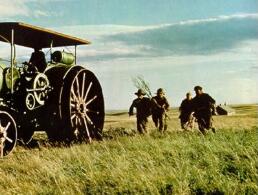Is It Really a Great Movie? Part Fourteen: Days of Heaven
by dan heaton
Using Roger Ebert's Great Movies book as a guide, this series of articles will focus on all films included on his list that previously have escaped my notice. Since all lists are subjective, I am not treating Ebert's choices as the essential selection of films. However, his essays offer the perfect chance for me to explore both classics and lesser-known pictures from around the globe.

I’m sad to admit that Terrence Malick’s four films had eluded me prior to this viewing. This fact partially stems from a conscious decision to avoid what appeared to be pretentious, boring stories. Would my presumption be correct? Before answering this question, here is some quick background. After directing the acclaimed Badlands in 1973, Malick did not complete another picture for five years. He spent two years editing Days of Heaven, which takes place in Texas immediately prior to World War I. This approach seemed worthwhile when the film earned considerable praise from critics and audiences. It received four Oscar nominations, and Nelson Almendros won for Best Cinematography. Malick received an array of awards, including Best Director from the Cannes Film Festival. Surprisingly, he would not direct another film for 20 years.
My viewing began with feelings of dread, but they quickly disappeared after the first few stunning images. Richard Gere’s Bill works in a Chicago factory and becomes involved in a nasty altercation over an unexplained issue. With very limited exposition, Malick introduces the environment and makes it compelling. Moments later, we join Bill, his love Abby (Brooke Adams), and young pal Linda (Linda Manz) looking for work at a large Texas farm. The bright landscape offers stunning images that make even their difficult situation enviable. Assisted greatly by the lush photography from Almendros (with a major assist from Haskell Wexler), Malick takes his time and reveals the natural beauty. I can imagine this film was a knockout on the big screen, but it’s still pretty impressive at home.
The prime story involves a love triangle between Bill, Abby, and the Farmer (Sam Shepard), who falsely believes that they are brother and sister. After a few brief conversations, the Farmer decides that he loves Abby, and eventually asks her to marry him. She obviously feels passionate about Bill, but this connection would offer them a nice home and financial security. Also, an overheard conversation reveals that the Farmer only has a year to live, so the marriage could be even more lucrative. Their decision is troubling, but it is understandable given their bleak prospects. The following year offers a calm, dreamy atmosphere for Bill, Abby, and Linda on the beautiful farm. Behind-the-scenes trysts do occur and could lead to disaster, but everything feels right for the trio. The Farmer appears to be a kind man, and their future outlook is bright. As the next year’s harvest looms, however, indications begin to appear that their serene world may face imminent destruction.
Much of the critical response to Days of Heaven has praised its photography but found shortcomings in the story. While it is fairly simple, I enjoyed the emotional conflicts and became involved with the characters. Much of the success does relate to Malick’s excellent direction and the gorgeous cinematography, which envelops you in the environment. Voiceover narration often is distracting, but this film uses Linda’s narration to add an emotional context. It feels like the warm retellings of an older woman, which could also explain the camera’s perspective on each character.
Roger Ebert describes Days of Heaven as “one of the most beautiful films of all time,” a claim that would normally feel like hyperbole. However, in this case it is an accurate description. Few films have offered such a consistently wondrous image, even when viewed on the small screen. I recently viewed Malick’s The New World, which includes grand visuals shot with better technology. However, it still pales in comparison to the simple majesty of his work on this film. It is easily the biggest surprise of the series to this point and again reveals the amazing possibilities of the moving image.
Copyright (c) 2007 erasing clouds |
|